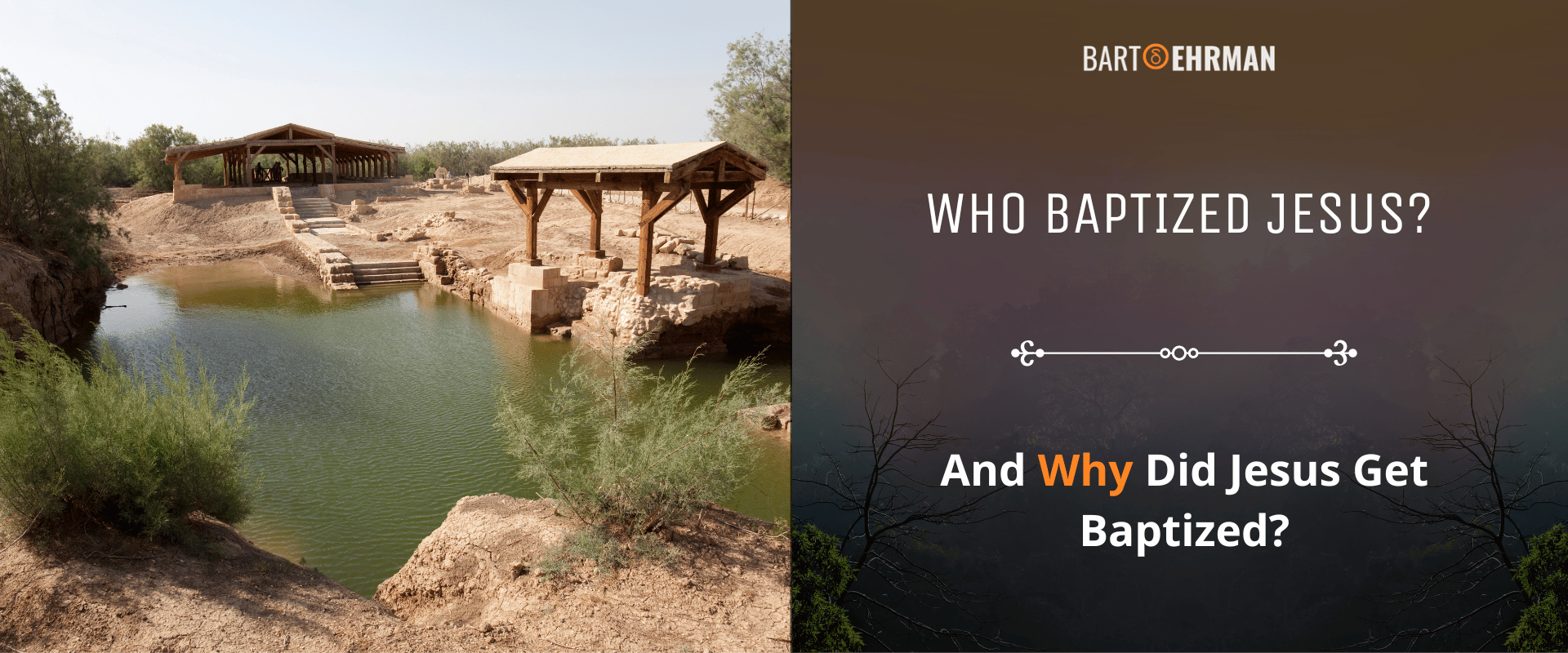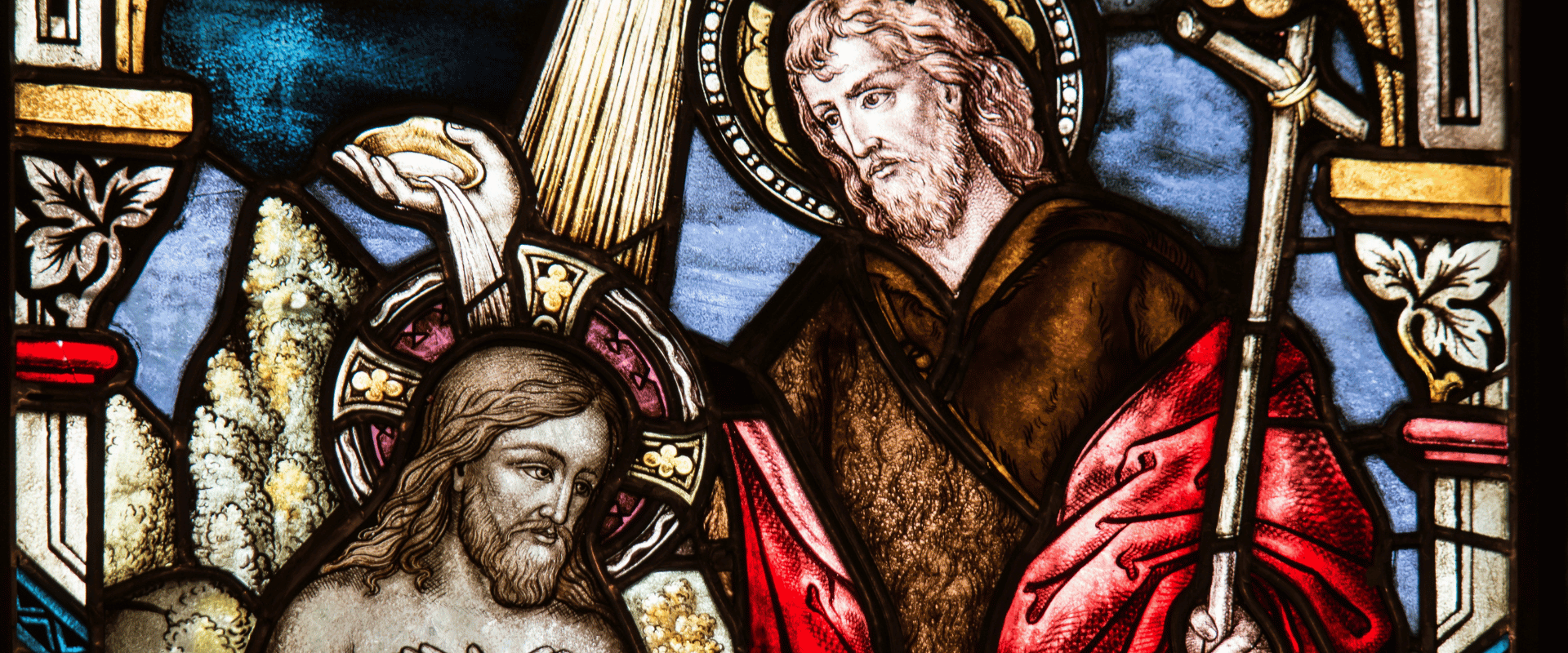Who Baptized Jesus? (And Why Did Jesus Get Baptized?)

Written by Joshua Schachterle, Ph.D
Author | Professor | Scholar
Author | Professor | BE Contributor
Verified! See our editorial guidelines
Verified! See our guidelines
Edited by Laura Robinson, Ph.D.
Date written: March 25th, 2024
Disclaimer: The views and opinions expressed in this article belong to the author and do not necessarily match my own. - Dr. Bart D. Ehrman
If you’ve read the Gospels, you know that Jesus was baptized at the beginning of his ministry. But who baptized Jesus? Who was worthy enough to undertake such a task? Additionally, since he was portrayed as the sinless Son of God, and since baptism was for the forgiveness of sins, why did Jesus get baptized at all?
While the Gospels name the person who baptized Jesus, scholars have known for decades that there is more to the story. In this article I’ll delve into who baptized Jesus, why Jesus was baptized, and what happened when he was baptized.

Who Baptized Jesus?
In one sense this is an easy question to answer. The Gospels say that Jesus was baptized by a man named John, often called John the Baptist. And while the Gospels are not always trustworthy historical sources, John Dominic Crossan says that the fact “that Jesus was baptized by John is as historically certain as anything about either of them ever can be.” Since we know that John baptizes Jesus, let’s begin with information about him.
Who Was John the Baptist?
Luke is the only Gospel to mention John’s birth. According to Luke 1:8-20, an angel appeared to Zechariah, an elderly priest, and announced that he would have a son named John who would “be great in the sight of the Lord.”
The story of John’s birth in Luke is also responsible for the tradition that Jesus and John were cousins, although the gospel does not explicitly state that. Instead, it indicates that John’s mother Elizabeth and Jesus’ mother Mary were somehow related, though the exact nature of their relationship is not specified.
Most scholars agree that Luke’s story is not a great basis for a historical reconstruction of John the Baptist’s life. The same is true of Luke’s claim that John and Jesus were related. If two such well-known figures had been relatives, wouldn’t the other Gospels have reported it as well? Since they don’t, scholars believe that this was a Lucan invention.
However, although not everyone written about in the Gospels can be historically verified, John the Baptist was absolutely a real person. One reason we know this is because a non-Christian Jewish historian of the 1st century, Flavius Josephus, writes about him as well, although he does not mention any connection between Jesus and John the Baptist.
In his book The Jewish Antiquities, Josephus writes about John’s preaching, saying that John “commanded the Jews to exercise virtue, righteousness towards one another, and piety towards God.” This accords pretty well with the description of John’s preaching in Luke 3:7-9.
However, it is also clear that while John probably wasn’t related to Jesus, they were contemporaries. John might have been an older contemporary since we see in the Gospels that his ministry started first.
FREE COURSE!
WHY I AM NOT A CHRISTIAN
Raw, honest, and enlightening. Bart's story of why he deconverted from the Christian faith.
Over 6,000 enrolled!
What Was John the Baptist’s Ministry All About?
In 1st century Palestine, where John the Baptist lived, apocalyptic worldviews were increasingly common. The main thrust of these views was that the world had been corrupted by sin. Therefore, God would soon intervene to punish the wicked and reward those who had been righteously faithful to him. This was John the Baptist’s message as well.
But how could a person become righteous enough to escape God’s wrath? This is where John’s baptism came in. The Gospels say that the purpose of his baptism was to show repentance to God and thus have one’s sins forgiven (Luke 3:3). In other words, by being baptized and living a moral life, a sincere person could escape God’s ultimate fury and live in God’s coming kingdom.
While Matthew and Luke both contain birth stories and other narrative details about Jesus’ early life, Mark, our earliest Gospel, begins Jesus’ story like this:
In those days Jesus came from Nazareth of Galilee and was baptized by John in the Jordan.
Notice that our oldest written tradition about Jesus begins when he is already an adult. It also begins with his baptism, presumably undertaken at his own request. Why would Jesus have asked John to baptize him?
Think about this: when a person goes to a church and asks to be baptized, what does that indicate about the relative status of the two people involved? Who is seen as spiritually superior, the baptizer or the one being baptized?
Why John Baptizes Jesus
One reason scholars are fairly certain that Jesus really was baptized by John involves a historical principle known as the criterion of embarrassment. This states that a story is probably historical if its events might embarrass the author or subject of the story.
As we will see, omitting the story of Jesus’ baptism was not an option for those telling his life story. It was such a widely-known fact that it had to be included by the Gospel writers. But why would Jesus' baptism by John be considered an embarrassment?
First, according to Mark 1:4, John’s baptism was supposed to be for “repentance for the forgiveness of sins.” But the early church believed that Jesus had never sinned. They would have to explain why he voluntarily underwent this ritual.
Second, Jesus was supposed to be superior to John. All four Gospels say that John’s only real purpose was to prepare the way for Jesus’ arrival. Since the superior usually baptizes the inferior – a priest baptizes a layperson, for example – why would John baptize Jesus?
Scholar Joel Marcus says that the fact that John the Baptist baptized Jesus indicates something interesting: Jesus was likely a follower of John the Baptist before beginning his own ministry. We know that John had many followers, or disciples, even after his death. It would appear, then, that Jesus started out as John’s disciple.
This possibility gave the Gospel writers a problem. If Jesus was superior to John, why did John baptize him and not the other way around? One way they dealt with this was by changing the story slightly.
Mark, our oldest account, starts by having John announce that someone far superior to him is coming. We assume, of course, that he is referring to Jesus. However, John baptizes Jesus in Mark without further comment.
In Matthew 3:14-15, on the other hand, when Jesus asks to be baptized, John protests, saying that Jesus should be baptizing him. Jesus patiently explains that he must be baptized in order to “fulfill all righteousness.” In other words, although Jesus is without sin, he still thinks it necessary to go through the motions by submitting to baptism.
In Luke, Jesus’ baptism is more of a collective rite, an “act of solidarity with his nation,” according to Joel Marcus, rather than a personal act. The Gospel of John, by the way, deals with this problem by never explicitly mentioning Jesus’ baptism, although it is implied.

What Happened When Jesus Was Baptized?
Let’s go back again to our oldest account of Jesus’ baptism in Mark’s 1:9-11:
In those days Jesus came from Nazareth of Galilee and was baptized by John in the Jordan. And just as he was coming up out of the water, he saw the heavens torn apart and the Spirit descending like a dove upon him. And a voice came from the heavens, “You are my Son, the Beloved; with you I am well pleased.”
There’s an important detail in this account which is often overlooked. Only Jesus sees the “heavens torn apart and the Spirit descending like a dove upon him.” Likewise, only Jesus hears the heavenly voice telling him that he is God’s beloved Son. In other words, this is a private experience happening to Jesus alone.
For this reason, Daniel Johansson notes that the majority of scholars view Mark’s Jesus as “an exalted but merely human figure.” In other words, Jesus is simply a righteous person and for this reason God “adopts” him as his Son, starting with his baptism. The other Gospels, of course, have a more glorious sense of Jesus’ identity.
Matthew’s version of the baptism is very similar to Mark’s, adding only that John protested that Jesus should be baptizing him instead. In Luke, however, there is a slight difference:
Now when all the people were baptized and when Jesus also had been baptized and was praying, the heaven was opened, and the Holy Spirit descended upon him in bodily form like a dove. And a voice came from heaven, “You are my Son, the Beloved; with you I am well pleased.”
Did you catch it? The difference is subtle but it’s important. In Mark’s account, only Jesus saw the heavens open, only Jesus saw the Spirit descend upon him, and only Jesus heard the heavenly voice. In Luke, it isn’t such a private experience. The heavens open, the Holy Spirit descends, the voice comes. It’s now an objective fact that others could observe as well.
This makes sense for Luke who portrays Jesus as having divine origins. In Luke, Jesus doesn’t need to be told who he is or that God is pleased with him; he already knows. It’s other people who need to know this.
Did You Know?
In reading the Gospels and other early Christian writings, scholars look for indications of the texts’ Christology. Christology deals with the identity, nature and work of Jesus. It can include interpretations of the Incarnation, the Resurrection, and the relationship between Jesus’ human and divine natures.
Scholars know, for example, that the Christology of Mark is very different from that of John. In Mark, Jesus seems to be a righteous man chosen by God to be his Messiah. Scholars call this a low Christology. In John, however, Jesus is the incarnation of God’s Word, both eternal and heavenly. This is a (very) high Christology.
Knowing the Christology of a Christian text helps scholars understand the perspective of the author and/or community that produced that text.
Conclusion
Anyone who has read the Gospels knows who baptized Jesus: John the Baptist, an apocalyptic 1st-century preacher. But how did this come about and why was Jesus baptized?
By the time the Gospel authors were writing their stories of Jesus, his baptism by John was already a well-known, established fact. Although this created problems for the Gospel narratives, which viewed Jesus as superior to John, excluding John and his baptism of Jesus would have been impossible.
Most scholars believe that Jesus was baptized by John because he was initially John’s disciple. This would explain why Jesus continued to preach the apocalypticism of John in his own ministry. However, whether he left John because John was arrested and killed or because he simply felt impelled to begin his own ministry, the fact remains that Jesus likely got his start with John.
The baptism, though, seems to have been a significant event for Jesus. The Gospels indicate that at his baptism, extraordinary things happened. For Mark and Matthew, the spiritual experience, including the opening of the heavens, the Spirit descending upon Jesus, and the heavenly voice, were only experienced by Jesus himself.
In Luke, however, these three elements are presented as objective facts, observable by everyone. Luke’s Jesus didn’t need confirmation of his special status. Those spiritual signs of his identity were for the benefit of other people.
FREE COURSE!
WHY I AM NOT A CHRISTIAN
Raw, honest, and enlightening. Bart's story of why he deconverted from the Christian faith.
Over 6,000 enrolled!
